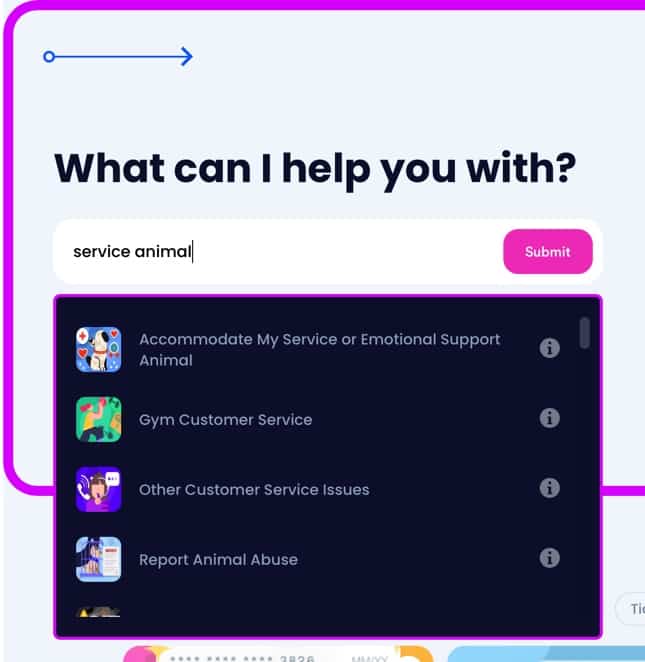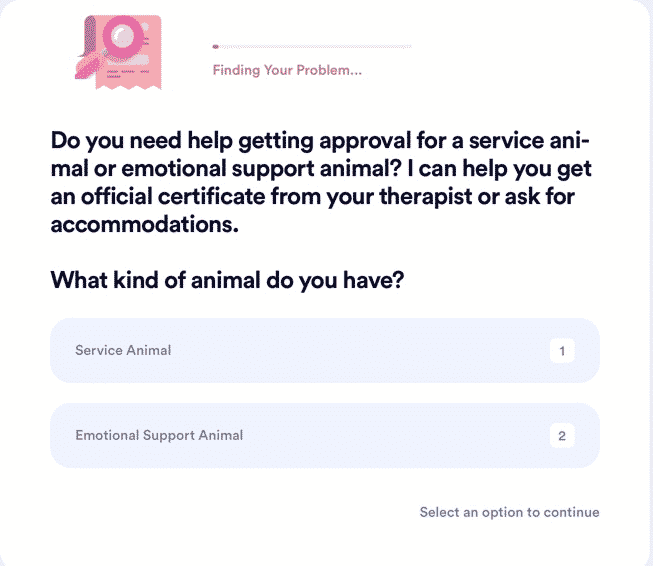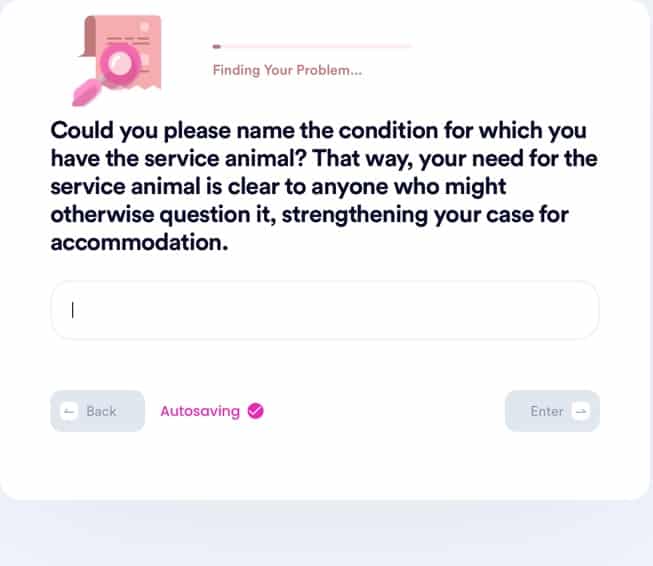Do You Have to Tell Your Landlord You Have an Emotional Support Animal?
The rapidly increasing need for emotional support animals (ESAs) has been hit by accommodation challenges. Landlords have become strict. Some deny ESA owners accommodation in their rental properties.
The restriction has left most ESA owners in a dilemma. ? That has become their ultimate worry.
It is vital to communicate effectively with your landlord for a better relationship. For this reason, you're advised to inform them of your ESA before moving in.
But if you can't inform your landlord of your ESA for one reason or another, or if you do and they deny you accommodation, DoNotPay will contact them on your behalf to ensure you stay nevertheless.
What Is an Emotional Support Animal?
An emotional support animal is an animal companion that provides benefits to a person with a mental disability.
The animal is intended to offer support and companionship that will help their owners with at least one aspect of their mental issues. Studies from the past on ESAs have shown that they've helped lower anxiety, depression, and some phobias.
A dog is the most common emotional support animal, followed by a cat. Other ESAs may be horses, pigs, donkeys, etc.
How Emotional Support Animals Help People:
| Improves Your Schedule | Schedules and routines may be very important, yet, schedules may seem tedious. A pet requires care and a certain routine. You must feed them; you have to walk them, bathe them, play with them, etc. Setting your schedule to be based on their needs can also impact your other day-to-day tasks. |
| Improve Memory and Focus | Pets are very good at keeping person-centered. If you forget to feed them, they will remind you. If you feel lost in thought, they can give you a nudge to remind you that they are there. |
| Improve Sleep | If you are someone who suffers from hyperactivity, you may feel unable to rest well at night. After running, walking, playing, and focusing on your pet throughout the day, you may be able to rest more at night. |
| Relieves Stress | Pets provide unconditional love to their owners. They are unable to yell or do things that may stress you. This can give you a sense of confidence and reduce your risk of depression or anxiety. |
Can a Landlord Deny an Emotional Support Animal?
Some landlords have a "no-pets-policy" that gives them the right to deny pet animals in their premises.
However, an emotional support animal is neither a pet nor a service animal. It offers emotional support to its owner but cannot handle specific tasks like service animals who undergo training.
The Fair Housing Act protects ESA owners. This law allows them to bring their ESAs into their homes or rental properties regardless of the housing policies of the premises.
Therefore, legally, . Instead, they must allow the animals for people with disabilities under reasonable housing accommodations.
How Can You Inform Your Landlord of Your Emotional Support Animal?
You need to follow steps to inform your landlord of your ESA:
- You must have an ESA Letter signed by a licensed mental health professional (MHP).
The ESA letter is the only proof that your animal is an ESA and not a pet. Therefore, even if your pet is working as your emotional support at the moment, aim to make it official by getting an ESA letter.
- Understand the basic ESA housing laws.
Before applying for a lease, ensure you read Fair Housing Act and understand the laws on reasonable housing accommodations.
For instance, you cannot force your landlord to allow you to bring a horse or a wild animal as an ESA. These are regarded as unreasonable accommodations. In the same spirit, 1 or 2 ESA dogs may be acceptable, but ten rabbits in a rental property are unreasonable.
- Be ready for a Q & A session with your Landlord
The landlord is permitted by law to request an ESA letter before allowing you and your pet into their premises. Expect to answer questions on your ESA, such as their species, if they're , or whether they've received any form of training.
When asked about training, inform the landlord that they're just like ordinary pets. ESAs are not required to undergo training like service animals.
- Be cordial and honest
You're more likely to have a great experience with your landlord on ESA-related issues if you're kind and friendly. Explain to them how easy-going and obedient your ESA is. You could even introduce the pet to them if possible.
Next Step if You Can’t Inform Your Landlord About Your Emotional Support Animal
Sometimes, we can't bring ourselves to . Some tenants fear that doing so will cause them to lose the rental property. And if they do so, the process is usually tedious and time-consuming.
Luckily, there's an alternative. DoNotPay's new product, “Service and Emotional Support Animals,” will contact your landlord of your ESA to ensure you receive the accommodation you deserve as supported by the Fair Housing Act.
Here's how DoNotPay can help:
- Search "service animal" on DoNotPay.

- Select the type of issue you need help with, including contacting your landlord about your ESA/service animal, asking your airline about ESA options, or requesting ESA/service accommodations at other venues.

- Answer a series of questions about your current situation and the details of your ESA/service animal, so we can generate the best results for you.

And that's it. DoNotPay will generate a letter to your landlord and mail it on your behalf.
Why Use DoNotPay to Inform Your Landlord About Your Emotional Animal?
It is crucial to use DoNotPay's product "service and emotional support animal" for your ESA housing issue with your landlord because it is:
- Fast: DoNotPay will generate an ESA letter and send it to your landlord on your behalf.
- Easy: Follow three simple steps and let DoNotPay handle the rest.
- Successful: You are guaranteed accommodation regardless of the "no-pets-policies" on some premises.
What Else Can DoNotPay Do for Your Pets?
Besides handling all your ESA-related issues, DoNotPay offers other services for your pet. These include:
- Lost and Found Pets
- Pet Custody Agreement
- Pet License
- Report Animal Abuse
- Animal control
 By
By